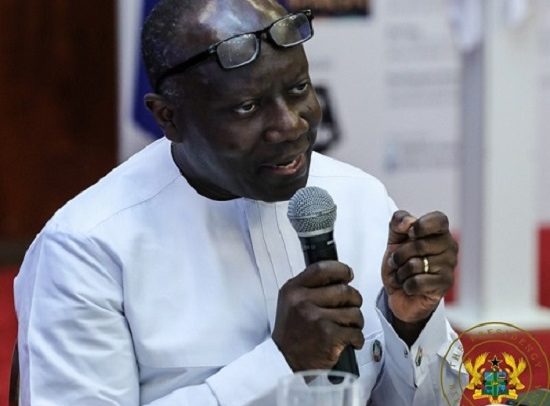Ken Ofori-Atta
Minister of Finance, Ken Ofori-Atta has said Ghana has begun experiencing slowdown in the various sectors of the economy as a result of the coronavirus pandemic.
The slowdown he explained will affect economic growth, and that the impact of the coronavirus menace on the real sector shows that the 2020 projected real Gross Domestic Product (GDP) growth could decline by 4.2 percent.
He said the projected growth will further worsen in the event of full lockdown.
“Even though events on the coronavirus pandemic are still unfolding, a preliminary analysis of the impact of the coronavirus menace on the real sector shows that the 2020 projected real GDP growth rate could decline from 6.8 percent to 2.6 percent with an outbreak and 1.5 percent with a partial lockdown,” he stressed on the Floor of Parliament on Monday during his address on the impact of the COVID-19 pandemic on the economy of Ghana.
He disclosed that government intended to prepare and implement a Coronavirus Alleviation Programme (CAP) to be funded with an initial amount of GH?1 billion as directed by President Akufo-Addo to mitigate the impact of COVID-19 on businesses and households and ensure that job losses are minimised.
Mr. Ofori-Atta said the President established a COVID-19 Fund to be managed by an independent board of trustees chaired by former Chief Justice, Sophia Akuffo, to receive contributions and donations from the public to support the CAP and to assist in the welfare of the needy and the vulnerable.
He disclosed that there would be a realignment of Statutory Funds towards expenditures that tend to mitigate the impact of the coronavirus pandemic (sanitation and health related expenditures), and pointed out that the government would also limit the award of new contracts whiles focusing on the payment of arrears.
Mr Ofori-Atta stated that government was looking forward to amend the Bank of Ghana (BoG) Act to allow for it to borrow from BoG up to 10 percent of previous year’s tax revenue in the event of tight domestic financing market conditions.
He said the Bank of Ghana and the Ministry of Finance had already engaged the commercial banks to discuss their support to the private sector to mitigate the impact of the coronavirus pandemic.
GH?3bn To Support Industries
He noted that the support includes a syndication facility of GH?3 billion to support industry, especially in the pharmaceutical, hospitality, service and manufacturing sectors, as mentioned by the President.
It again would include the granting of six-month moratorium of principal repayments for selected businesses and the reduction of interest rates priced-off the Ghana Reference Rate (GRR) by 200 basis points (2 percent per annum).
“Mr. Speaker, we will call on the pension funds and other assets managers and investors to follow the lead of the banks to support by accepting a 200 bps reduction on short term instruments, including T-bills and 364-day paper. This should reduce government expenditure on interest expense by over GH?300 million to help close the fiscal gap,” the Minister intimated.
NHIA Gets GH?300m
Mr Ofori-Atta said GH?300 million had been paid by the Finance Ministry to National Health Insurance Authority (NHIA), and pointed out that the payment was done on Friday, March 27, 2020 as part of measures to provide liquidity to health care providers and the pharmaceutical industry.
“In addition, the Government arranged Life and Sickness Insurance for our Health Care Professionals on the front line of the Health Care Pandemic,” he revealed.
He indicated that government was also engaging the telecommunication companies to reduce the cost of data and telecommunication services to households and small businesses as part of the mitigating measures on the citizens and industries/businesses.
According to him, the Ghana Revenue Authority (GRA) has been asked to provide some reliefs to businesses and households, including extension of due dates for filling of taxes from four months to six months after the end of the basis year.
He said the COVID-19 pandemic had led to tight financing conditions both in the global and domestic financial markets, and added that the slowdown in economic activities was likely to result in debt service difficulties (especially from the sectors that are hard hit such as aviation and hospitality) and containment measures such as social distancing may lead to reduced productivity and job losses.
By Ernest Kofi Adu, Parliament House


